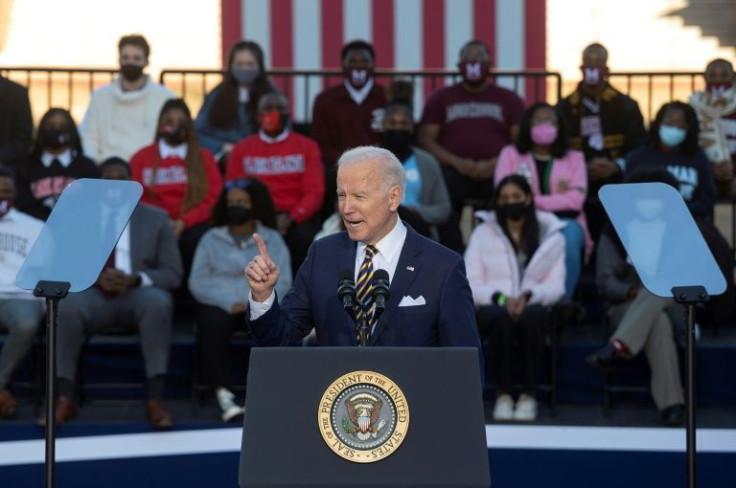Biden Has Doubts Voting Rights Bill Will Pass

President Joe Biden expressed his doubts about his party’s ability to pass key voting rights legislation after a closed-door meeting with senators on Thursday after Sens. Kyrsten Sinema, D- Ariz., and Joe Manchin, D- W. Va., announced they will not support amending the filibuster.
“The honest-to-God answer is I don’t know whether we can get this done,” Biden told reporters after leaving the hour-long meeting on Capitol Hill.
Hero: a person who is admired or idealized for courage, outstanding achievements, or noble qualities.
— Jamaal Bowman (@JamaalBowmanNY) January 14, 2022
Traitor: a person who betrays a friend, country, principle, etc.
John Lewis is a hero, you are a traitor to his legacy, your constituents and our democracy. https://t.co/bS8PW6QwcB
NEW: Biden to host Manchin, Sinema at White House to discuss voting rights https://t.co/KKMi1OVWDx pic.twitter.com/I5eN5c71cG
— The Hill (@thehill) January 13, 2022
Despite the massive setback, Biden remains hopeful his party will be able to get voting rights legislation passed despite Sinema and Manchin witholding their support for another key piece of his agenda.
“As long as I have a breath in me, as long as I am in the White House, as long as I’m engaged at all, I’m going to be fighting to change the way these legislatures [are] moving,” Biden added.
Democrats have been struggling to pass a pair of voting rights bills titled the Freedom to Vote Act and the John Lewis Voting Rights Bill in response to restrictive voter ID laws in states like Georgia that Biden previously compared to Jim Crow-era legislation.
The Freedom to Vote Act is designed to establish automatic and same-day voting registration, protect mail-in voting, make election day a national holiday, prohibit partisan gerrymandering, expand protections for minority voters, and make campaign finance laws more transparent.
The John Lewis Voting Rights Bill would revive section 4(b) of the 1965 Voting Rights Act reversing a 2013 Supreme Court decision and require states with a history of voting discrimination to get approval from the Justice Department if they want to change their election laws.
Opposition from Senator Kyrsten Sinema and Senator Joe Manchin sinks Democrats’ hopes to jettison the Senate's filibuster rule and pass a voting-rights bill https://t.co/be7GDAGdTJ pic.twitter.com/PyqRN4aLKX
— Reuters (@Reuters) January 14, 2022
"It's incredibly ironic that she called John Lewis her hero, but she's going to allow Republicans to filibuster the John Lewis Voting Rights Act on Martin Luther King Day," Ari Berman says of Sen. Sinema.https://t.co/GRVvdOK4tR
— MSNBC (@MSNBC) January 14, 2022
In order for both bills to pass, Democrats would need to amend the filibuster to either a talking filibuster or a carveout so only a majority vote would be needed to pass both bills rather than the required 60. All 50 Senate Democrats would need to agree to amend the filibuster.
Sinema announced she did not support changing Senate rules and spoke of her “long-standing” support for the filibuster.
“I will not support separate actions that worsen the underlying disease of division infecting our country. Eliminating the 60-vote threshold will simply guarantee that we lose a critical tool that we need to safeguard our democracy,” Sinema told reporters.
Manchin also announced his opposition to the rules change, saying: “Ending the filibuster would be the easy way out. I cannot support such a perilous course for this nation.”
Progressives and activists have grown incredibly frustrated with the pair over the past year as they continue to obstruct vital pieces of the president's agenda. Biden's inability to get his entire party to fall in line with his agenda has made him look ineffective and weak. If voting rights fail to pass, it will break a major promise he made to Black voters and prove detrimental to Democrats in the midterm elections.
Senate Majority Leader Chuck Schumer, D-N.Y., had previously vowed to reform the filibuster by Jan. 17 and urged his fellow Democrats to vote to do so.
“I ask my Democrat colleagues to consider the following — if the right to vote is the cornerstone of our democracy, then how can we in good conscience allow for a situation in which the Republican Party can debate and pass voter suppression laws at the state level with only a simple majority vote, but not allow the United States to do the same?” Schumer said.





















